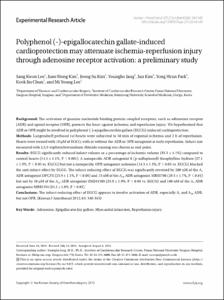KUMEL Repository
1. Journal Papers (연구논문)
1. School of Medicine (의과대학)
Dept. of Preventive Medicine (예방의학)
Polyphenol (-)-epigallocatechin gallate-induced cardioprotection may attenuate ischemia-reperfusion injury through adenosine receptor activation: a preliminary study
- Keimyung Author(s)
- Lee, Mi Young
- Department
- Dept. of Preventive Medicine (예방의학)
- Journal Title
- Korean Journal of Anesthesiology
- Issued Date
- 2012
- Volume
- 63
- Issue
- 4
- Abstract
- Background: The activation of guanine nucleotide binding protein-coupled receptors, such as adenosine receptor (ADR) and opioid receptor (OPR), protects the heart against ischemia and reperfusion injury. We hypothesized that ADR or OPR might be involved in polyphenol (-)-epigallocatechin gallate (EGCG)-induced cardioprotection.
Methods: Langendorff perfused rat hearts were subjected to 30 min of regional ischemia and 2 h of reperfusion. Hearts were treated with 10 μM of EGCG, with or without the ADR or OPR antagonist at early reperfusion. Infarct size measured with 2,3,5-triphenyltetrazolium chloride staining was chosen as end-point.
Results: EGCG significantly reduced infarct volume as a percentage of ischemic volume (33.5 ± 4.1%) compared to control hearts (14.4 ± 1.1%, P < 0.001). A nonspecific ADR antagonist 8-(p-sulfophenyl) theophylline hydrate (27.1 ± 1.9%, P < 0.05 vs. EGCG) but not a nonspecific OPR antagonist naloxone (14.3 ± 1.3%, P > 0.05 vs. EGCG) blocked the anti-infarct effect by EGCG. The infarct reducing effect of EGCG was significantly reversed by 200 nM of the A1 ADR antagonist DPCPX (25.9 ± 1.1%, P < 0.05) and 15 nM of the A2B ADR antagonist MRS1706 (29.3 ± 1.7%, P < 0.01) but not by 10 μM of the A2A ADR antagonist ZM241385 (23.9 ± 1.9%. P > 0.05 vs. EGCG) and 100 nM of the A3 ADR antagonist MRS1334 (24.1 ± 1.8%, P > 0.05).
Conclusions: The infarct reducing effect of EGCG appears to involve activation of ADR, especially A1 and A2B ADR, but not OPR. (Korean J Anesthesiol 2012; 63: 340-345)
Key Words: Adenosine, Epigallocatechin gallate, Myocardial infarction, Reperfusion injury.
- Keimyung Author(s)(Kor)
- 이미영
- Publisher
- School of Medicine
- Citation
- Sang Kwon Lee et al. (2012). Polyphenol (-)-epigallocatechin gallate-induced cardioprotection may attenuate ischemia-reperfusion injury through adenosine receptor activation: a preliminary study. Korean Journal of Anesthesiology, 63(4), 340–345. doi: 10.4097/kjae.2012.63.4.340
- Type
- Article
- ISSN
- 2005-6419
- Appears in Collections:
- 1. School of Medicine (의과대학) > Dept. of Preventive Medicine (예방의학)
- 파일 목록
-
-
Download
 oak-aaa-03404.pdf
기타 데이터 / 661.46 kB / Adobe PDF
oak-aaa-03404.pdf
기타 데이터 / 661.46 kB / Adobe PDF
-
Items in Repository are protected by copyright, with all rights reserved, unless otherwise indicated.